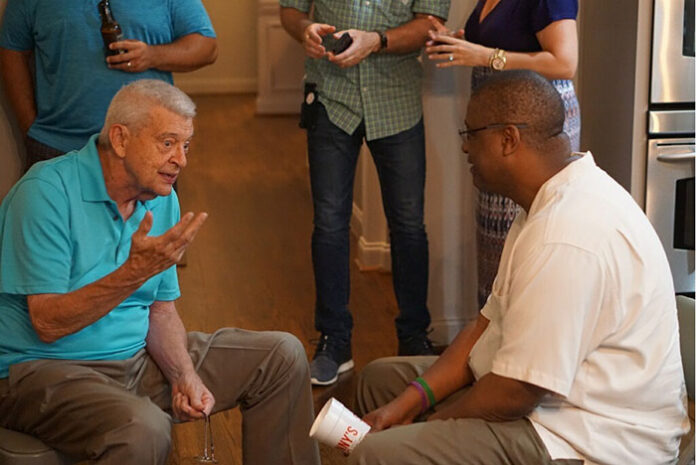
Bob Nastase was several things.
Educator. Family man. Old school. A fiery coach who stopped at nothing to push his teams to championships. A tyrant. Merciless. A perfectionist.
Nastase was the head boys basketball coach at Toms River High School, later known as Toms River South, during the 1964-65 season.
Intrigued by the Biddy Basketball League in the township, Nastase left Toms River and built his legend at Lakewood beginning during the 1965-66 campaign. He coached the Piners to Holiday Jubilee, Shore Conference divisional, Shore Conference Tournament, New Jersey State Interscholastic Athletic Association sectional and state Group titles. His 1966-67 and 1974-75 teams captured NJSIAA Group III state championships. He guided the Toms River North Mariners to crowns during the 1990s.
Nastase died of natural causes at the age of 86 on Sunday, March 13, at Novant Presbyterian Hospital in Charlotte, N.C.
A member of Nastase’s first team at Lakewood was Ron Engel. The Piners received an early dose of Camp Nastase on the day after Thanksgiving.
“We had double sessions that lasted from 9 a.m. until about 4 p.m.” said Engel, who was to own Engel Fuel in Lakewood with his brother, Marty. “There were physical, film and skull sessions. We all brought lunches.”
The hard work paid off. The Piners won the NJSIAA Central Jersey Group III and Shore Conference Class B South championships.
“Coach had a list of the things that he wanted us to do each day in practice,” Engel said. “Everything was timed … 15 minutes for that drill and 90 minutes for another drill. The conditioning of his players was very important to coach.”

Engel said he enjoyed playing for Nastase, who coached Lakewood through the 1977-78 season, often barking instructions in language as blue as the Piners’ uniforms during games and practices.
“He treated everyone the same,” he said. “You knew he would be there for you. It made no difference whether you started or were the 10th or 12th man. He treated everyone the same. Playing for coach Nastase was truly a wonderful experience. In one year, I learned more basketball than I did in my entire career before that. He was big on fundamentals. We did them over and over. That’s how you win games. Before every game, each of us had to shoot 50 free throws.”
Engel said Nastase taught his players more than basketball.
“He instilled an attitude in us to never give up,” Engel said. “He said, ‘You always have a shot.’ After practice, he talked about life. He set a tone with everyone. He said, ‘In life, there will be ups and downs. If you lose, it’s not the end of the world.’ He felt if you had a setback in life you could still rebound from it.”
Nastase was a stickler for conditioning. His teams were rarely outworked. He punished his Piners with sprints and distance runs during practices.
“I’m going to burn those lungs of yours,” he often barked at practices. “You guys are too good to loaf. I’m not gonna let ya loaf.”
Nastase often said, “No team of mine ever lost because it was out of shape.” Players looked forward to the games as they were often easier than the practices. Unhappy that one of his Piners could not remember how to execute an offensive play, Nastase unleashed an expletive-filled tirade, smashing his clipboard near the feet of a scribe. Nastase often coached in a blue suit. Fans took good natured bets on how long it would take for Nastase to rip off his tie.
“Coach Nastase’s practices were very intense, very long and very tiring,” said Lakewood player Mike Bateman, a guard on the 1966-67 and 1967-68 teams. “His belief was practices should be so tough that the games would be easy. He was a very tough taskmaster.
“One time after a lackluster five-hour practice until 8 p.m. all of us were dead tired. Coach was upset with our effort. He told us to get outside on the quarter-mile track and run. And run we did – 32 times around the track for an eight-mile run. Maybe our practices weren’t quite Navy Seal training or State Trooper training, but they were probably pretty close to that type of training.”
Practices consisted of various drills led by four stagers. Players sprinted to the foul line and back to the baseline. They dashed to half court and back to the baseline. They raced to three-quarter court and back to the baseline. And they ran from the baseline to the length of the court and back to the baseline. Assistant coaches made sure the sprints were done properly. If one player “dogged it,” to quote Nastase, the whole team repeated the sprints until he was satisfied.
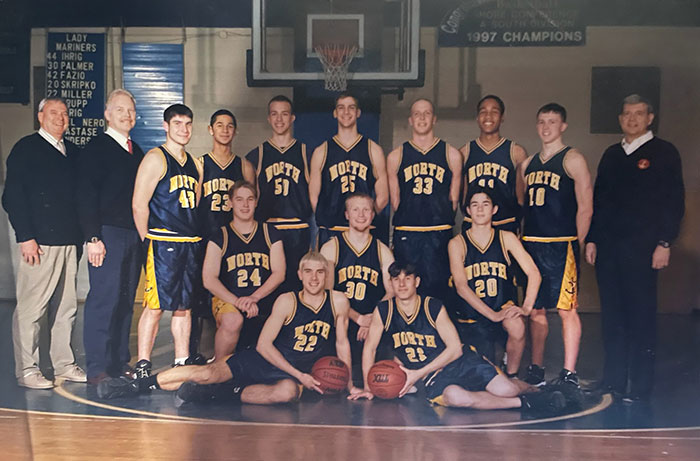
“There were many repetitions,” Bateman said. “No rest for the weary. Practice also consisted of scrimmages and game day prep. Coach was totally organized in his practices and had everything written out as to the practice schedule. His personality during practice was super intense. He demanded perfection and if the players were not executing to perfection we’d go back and do it over and over again until we got it right.
“Coach Nastase made us into basketball players. You knew exactly where you were to be on the court at all times. In those days, belly baseline was a key component of our games as well as ball-you-man. By constant practicing and like a great chess master, coach Nastase always had us in the right positions on the basketball chess board.”
Nastase often pulled his starters from the game when he was unhappy with their play. While coaching at North, he left the gym during a game, unsatisfied with the Mariners’ defensive play.
“Coach Nastase was extremely intense during games,” Bateman said. “If you made a bonehead play, there was a good chance you were coming out. Another favorite expression was that he would label us as ‘Yardbirds.’ Coach was always on top of the game action and like a chess master was thinking five moves ahead.”
Nastase built his teams on the 4 D’s: dedication, desire, discipline and defense.
“In order to be a winner, coach Nastase preached that you had to have dedication to the game, the desire to win and the discipline to remain focused,” said Bateman, a lawyer for more than four decades and a municipal court judge in South Toms River. “He said, ‘In this competitive world, never give up. And if you are dedicated to your goals and disciplined in pursuing those goals you will win in life.’ Coach Nastase used basketball to make his players good citizens and upstanding adults in later life.
“He was so successful because he was head and shoulders over other coaches in the x’s and o’s in the Bobby Knight tradition. He took what he learned from coach Knight’s coaching camps and applied it to his teams. Nobody outworked coach Nastase’s teams. The combination of basketball knowledge, hard practices and top-notch conditioning always placed coach Nastase’s teams at the top at the Shore.”
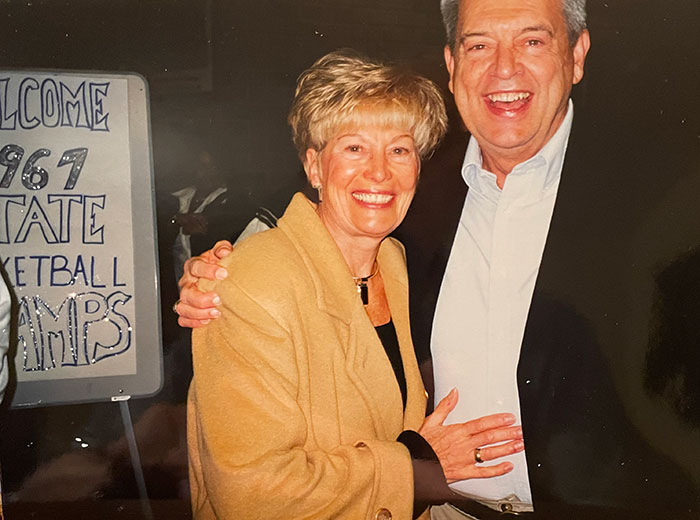
There was a time when noisemakers, led by cowbells, were allowed at athletic events. Lakewood fans often roared their approval at decibel shattering levels, clapping, stomping their feet and exchanging high-fives and embraces as their beloved Piners excelled in every phase of the game in their small gym and at the current Lakewood facility. Nastase and then Lakewood Board of Education member Dave McKelvey helped design the Piners’ current facility, which opened during the early 1970s.
“Home games at the old Piner Palace were raucous,” Bateman said. “The gym was a bandbox, extremely tiny with crowds on top of the court. Over the buzz in the stands, you would hear JoJo Woodson’s voice bellowing out, ‘Give me a P. Give me an I. Give me an N. Give me an E. Give me an R. Give me an S. What’s that spell? Piners!’ ”
Bateman said a large crowd greeted the Piners on their arrival from Convention Hall in Atlantic City where the Piners won the Group III state title during the 1966-67 season, beating Weehawken 74-51 in the championship game. Lakewood won 24 games and lost three. The Piners were honored with a postseason dinner at the Fairmont Hotel in downtown Lakewood.
“I don’t think there was anyone left in their homes when the team’s bus got back to Lakewood,” he said. “The entire town was there to greet us when we returned to where the old and wonderful Peterson’s Restaurant (Peterson’s Sunset Cabin, founded by George and Lillian Peterson) stood. Little Lakewood had conquered the mountain and the whole town was out to cheer our team and the man who put Lakewood basketball on the map.”
To hear Bateman tell it, Nastase could charm the ink off a dollar bill when he was away from the court.
“He was very friendly with a very good sense of humor,” Bateman said. “He was a very good speaker on his feet and his persuasive manner could charm a crowd. He loved chit chatting and you could see a sly smile creep across his face as he held court off the basketball court. It was like two personalities. He was as friendly off the court as he was intense during either practice or a game. Somehow, though, you couldn’t help but think that basketball talk was just a spark away.”
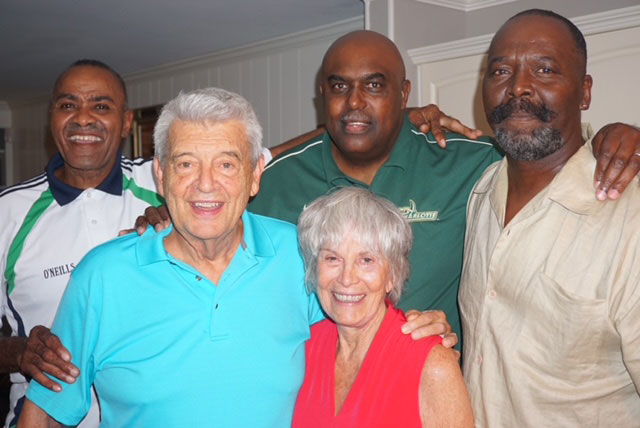
Nastase made extensive use of video and movies. Practices and games were taped and shown to his players to improve their performances. He showed his teams the movie about Bob Richards, the Olympics champion and Wheaties spokesperson.
“The key line from the movie was, ‘I won’t be eating cinders no more,’ ” Bateman said. “He referred to the cinders on the track when winning the Olympics. Perhaps no player was influenced more by coach Nastase than John (Pott) Richardson. He went from a skinny young boy to a state champion senior and All-State Player.”
Richardson was a key player on the 1966-67 team. He was an assistant coach under Nastase in 1974-75 and enjoyed a highly successful coaching career as the Piners’ boys mentor. Lakewood’s gym was named in Richardson’s honor several years ago.
“I am greatly saddened at coach Nastase’s passing,” Richardson said. “I will miss our phone calls. He was always encouraging and uplifting. He made me strive to be the best I could be. He made me believe in myself more and inspired me to work harder. Playing for him was great because I bought into his hard work, positive attitude philosophy. Practices were long and hard and not for everyone. He always wanted to bring out the best in you.
“When the gym was named for myself, I was extremely humble and grateful. I was tremendously thankful to coach Nastase because there would not have been a John (Pott) Richardson the player or coach without him.”
Richardson, a retired Lakewood educator and coach, played for the Temple University Owls. He earned the Harry Litwack Award for Leadership, named for the then-Temple coach.
“Coach always emphasized the importance of being a good person first,” Richardson said. “He would always say, ‘Good things happen to good people.’ He made me set goals in the classroom and think positively about my future. When I played for Temple, I could not believe how easy our practices were when I compared them to high school. When I was at Temple, I ran extra four-stagers so that I would not fall out of shape.”
Richardson was an assistant coach under Nastase from 1973-78. He served as the Piners’ unofficial psychiatrist, advising players who found Nastase’s demands too tough to remain with the club.
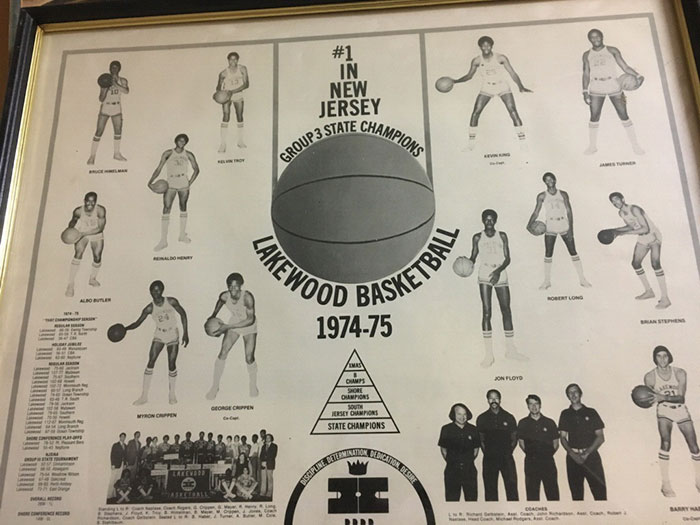
“Guys were challenged by coach,” Richardson said. “We had to run the four-stages in 29 and 27 seconds. They had to decide if they were going to stick with it or not. We encouraged them to come back. If you bought into it, you enjoyed it. Coach said, ‘If you are going to be successful, you have to be willing to outwork others and do the things they won’t do.’ Coach Nastase recruited me to coach with him. He wanted me to help with the mental aspects of the game, telling the players to not give up.”
Richardson and Harold Sutton were members of the 1965-66 team, which lost 49-47 to Memorial of West New York in the Group III semifinals. The setback burned inside the Piners’ stomachs like hot coals.
“On the bus back to Lakewood, we said, ‘We will be back next year,’ ” said Richardson, who co-captained the 1966-67 team with Sutton. “We went to coach and said, ‘we want to be state champs.’ He said, ‘This is what you are gonna have to do.’ We were willing to run extra sprints.”
Richardson was Lakewood’s head coach from 1985-2007, finishing his career with 401 wins and 152 losses. He led Lakewood to numerous titles, including the South Jersey Group III crown in 2002.
“I tried to instill the same positive belief levels in my players that he instilled in me,” Richardson said. “The never give up and never quit philosophy that I learned from Bob is what I preached to my players. I always used his defensive principles.”
Richardson said Nastase’s coaching style would work today.
“I think his strong mental and high expectations approach would work,” he said. “When we talked, he said he had to make adjustments to time constraints and extremely hard practices. Times have changed today and he said that he could not work the kids as hard as he did us in the ’60s. Coach Nastase was so successful because of his dedication and hard work ethic. His sincere and deep involvement in the lives of his players contributed greatly to his success. He was able to get inside the heads of his players. He inspired them to overachieve.
“Coach Nastase gave his players a winning philosophy for living. For this and much more, his positive effect on the lives of his players is immeasurable. Thank you coach for all you have given me. The positive lessons are for a lifetime. RIP.”
Richardson thanked former Lakewood three-sport athlete Sam Christopher, who owned the town’s newspaper, the Ocean County Daily Times, for his support of the Piners.
“Mr. Christopher and his newspaper were instrumental in our success,” Richardson said.
One of Nastase’s best players was 6-foot-5 center Kevin King, who starred on the 1974-75 team. The Piners were 28-1, losing to Christian Brothers Academy. The team was honored with a dinner at the Woodlake Country Club in Lakewood.
“Coach was so successful based on his ability to relate to his players,” King said. “All the players bought into his system and we knew if we worked hard and did the little things in practice it would carry over into the games. Coach also had a proven record of achievement as it related to basketball – drills, drills, drills – over and over. We saw the final product. Every point we scored going from defense to offense was because of coach Nastase. If we produced on defense, our points would mount up on offense.”
“His personality during practice was intense. He didn’t let anything distract him from what he needed to do. Coach had an outline of things he wanted to go over and we didn’t leave practice until they were accomplished.”
Engel said his team was inspired by “Sweet Georgia Brown.”
“The playing of the song was a tradition at Lakewood before we played,” he said. “It got everyone psyched up. The whole crowd stood up and clapped. The song got everyone into the right mood.”
King said spaghetti dinners often took place among team members at Nastase’s home on Todd Road in Toms River.
“Those dinners were great, but coach always seemed to bring up basketball,” King said with a smile. “They brought us together as a team away from the court and coach made us know everything about each teammate. Everyone knew their role on the team and everyone accepted who was the leader. Accountability with each other was some of the main focus during these dinners.”
Nastase also was a big believer in weight lifting for his Piners. Strength training sessions took place at the Lakewood home of Bob Ottmer on Hudson Street and his downtown gym, Ottmer’s Iron Den. Ottmer was affectionately known as Mr. Bob. Nastase also entered a team, known as Bob’s Boys, composed of his players in a summer league at the Ella G. Clarke School in Lakewood.
“The players left marks with their fingernails on the ceiling at my home,” Ottmer often said with a smile. “That’s how high they jumped.”
King, who trained under Ottmer’s direction, continued his career at the University of North Carolina at Charlotte where he competed in the 1976 NIT final and the Final Four of the 1977 NCAA Tournament. King played under Nastase when his mentor was an assistant coach with the 49ers. The reunion took place during King’s senior season. Nastase coached UNCC from 1978-82 after leaving Lakewood.
“Having coach Nastase there for my senior year was a blessing and pleasure,” King said. “Coach brought a lot of the things we did in high school that made us successful.”
King enjoyed a distinguished career in corrections, the Army and the National Guard.
“In every aspect of life, the lessons coach taught me will never be forgotten,” King said. “I am the person and player I am today because of some of his teaching. I’m very fortunate that I had great coaches who assisted me with my development as a player, but coach Nastase showed me the basic fundamentals and how to improve them. Coach taught us to be accountable for your actions and to give 100 percent in everything you do. Integrity was a very strong point in coach Nastase’s teaching. He said, ‘If you cheat yourself, you will cheat others.”
King said he has been deeply touched by the 4 D’s.
“They have influenced a lot of my decisions on and off the court,” he said. “You have to have all four of those elements to survive on the court as well as off.”
Richardson noted that Nastase produced several career varsity 1,000-point scorers, including Pierre DeCausey, Jose DeCausey, Marvin Geathers, Leon Baker, Tommy Briscoe (who played at the University of Virginia), Kelvin Troy, Myron Crippen, King and Darius Griffin, at Lakewood.
Troy’s two free throws with one second left in the fourth quarter gave Lakewood the 1974-75 Group III state title with a 72-71 win over East Orange at Brookdale Community College. Trailing 71-70, the Piners dashed the length of the court in five seconds, using what was to become known as the Five-Second Play. Senior guard George Crippen missed a shot from the field, setting off pandemonium among the East Orange fans.
Thinking their Panthers won the game, they stormed the court in celebration. It took the referees several minutes to restore order and Troy, fouled in the act of shooting on a layup, calmly netted what were to become known as The Shots Heard ‘Round the Shore. Lakewood’s fans – some wearing blue and white “Do It Piners” buttons – roared their approval and stormed the court as the game ended.
The buildup to the game was tremendous. Downtown merchants hung Daily Times coverage previewing the game in their storefront windows. Entering the game, East Orange was ranked first in the state and Lakewood second by the New York Daily News, which reversed the rankings after the contest.
“I can remember the large crowd, the noise and the supporters shouting for each of their teams,” said King, who captained the Piners with George Crippen and senior guard Barry Haber. “I believe this was the largest crowd we played before and it was exciting.”
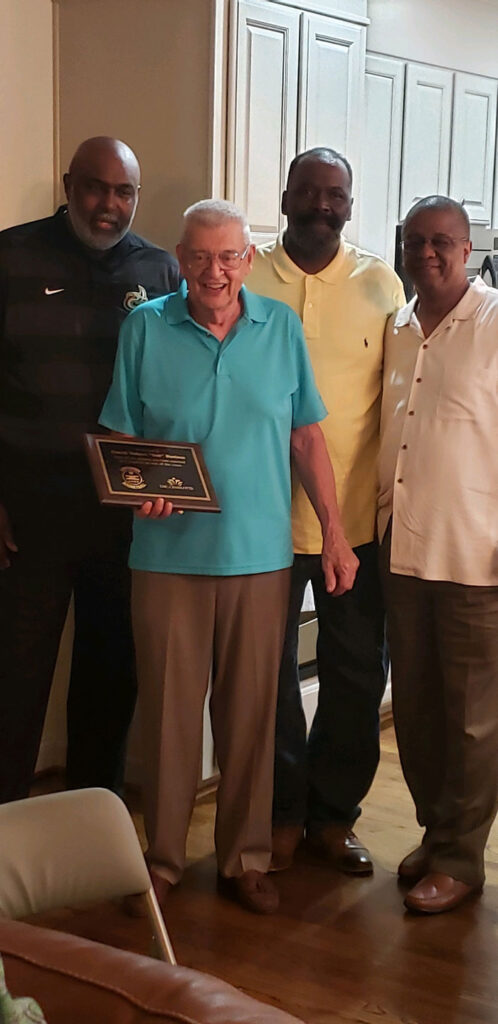
Troy, who buried the free throws during his sophomore season, starred at Rutgers University and at the professional level in Ireland. He wrote a book, “Kelvin Troy, the Black Irishman,” about his experiences overseas.
A former Lakewood player who attended the epic game was guard Wayne Jupiter.
“I was lucky enough to get on the court and congratulate coach,” he said on Facebook. “He was tough on me. I liked to shoot from 21 (feet) and he wanted power moves (LOL). But looking back I learned so much from him and not just basketball.”
Nastase coached the Mariners to Class A South crowns in 1995, 1996 and 1997. They fell to Christian Brothers Academy in the 1996 SCT championship game. He produced career varsity 1,000-point scorers in guards Greg Adams and Ron Sermarini and forward Mike Ritacco.
Adams and Nastase often argued nose to nose during timeouts. Despite their exchanges, Adams loved playing under Nastase.
“It was an absolute pleasure to play for coach Nastase,” Adams said. “At the time as a 16-17 year-old kid you wondered why you needed to work so hard and put in all of those hours, not only on the court but in countless video sessions. But now that I look back at it all he had only my best interest at heart. He pushed me on a daily basis to not only be a better player but to be a better person and teammate.
“Coach had a huge influence on me on the court. He taught me that with hard work and determination you can achieve anything you set your mind to. He made sure everyone on the team had a role and if we each carried out our goals together we would achieve the goals we wanted to achieve.”
Adams said Nastase treated the Mariners as if they were college players.
“He ran our team like a Division I college program,” Adams said. “We watched more film than any team on any level does anymore. At an age when all you wanted to do was cut corners he made us understand the difference between trying to be our best instead of just getting by. I truly love him for that and can say he was one of the most influential people in my life.”
Adams said Nastase has had a large influence on the Mariners. Even to this day.
“His influence on me and others who played for him is undeniable,” Adams said. “We are told sports and coaches can build character in young people that will carry beyond the basketball court and their playing days. This is, without question, the case with coach Nastase. As a high school student-athlete, I benefited from his constant emphasis on hard work, teamwork and attention to detail. Coach’s constant emphasis on these and other principles, along with his consistent demeanor in modeling them, forged positive attributes that have served me well.
“As an educator and coach myself now for nearly 20 years, I have tried to follow in coach Nastase’s footsteps as a positive influence on student-athletes. So in that regard his legacy lives on.”
Adams enjoyed Nastase’s sayings.
“He had some great sayings that our whole team enjoyed and we still use them today,” Adams said. “One was calling us a yardbird. I have no idea what that means, but for three years that is what I thought my name really was. I officiated a Manasquan game this year and I heard Manasquan coach Andrew Bilodeau, who enjoyed a close relationship with coach Nastase, say it to one of his players. I told him ‘I haven’t heard that since ’97.’ Other sayings were Hambone Harry and, ‘We could not hit a pig’s tail with a shovel.’ “
Nastase, a Penn State graduate born in Beaverdale, Pa., coached men’s basketball as an assistant at Oral Roberts in Oklahoma. He was the head coach at Myers Park High School in Charlotte where his teams won several conference titles. One of his Myers Park players was Haywoode Workman, who competed in the National Basketball Association in which he has served as a referee.
Nastase also was the head coach of the United States Basketball League’s New Jersey Jammers, a men’s minor-league pro team which played its home games at Lakewood High School. Richardson played and coached as an assistant at the age of 42 under Nastase with the Jammers. Richardson is one of the oldest players to score a point in a men’s professional basketball game.
Willie Troy, who played under Nastase at Lakewood, King, Larry Bushman, who filmed numerous Lakewood games and practices, and Toms River High School and South football coaching legend Ron Signorino were among the attendees at Nastase’s funeral services. Signorino read Bible verses.
Signorino and Nastase were fraternity brothers at Penn and brothers-in-law. King and ex-UNCC player Donnie Koonce were pallbearers. Lee Whitfield and Todd Crowley of UNCC’s Final Four team paid their respects. The Eulogy was delivered by Father Jeffrey Kirby of Our Lady of Grace Catholic Church where Nastase and his wife of 61 years, Agnes, were charter members in Lancaster, S.C. Nastase was buried in the Crown Memorial Park in Pineville, N.C.
“Father Kirby … spoke of coach’s background, what an outstanding person he was and his dedication to God, family and coaching young men,” King said. “The atmosphere was sad, but joyful.”
RIP coach Nastase.






